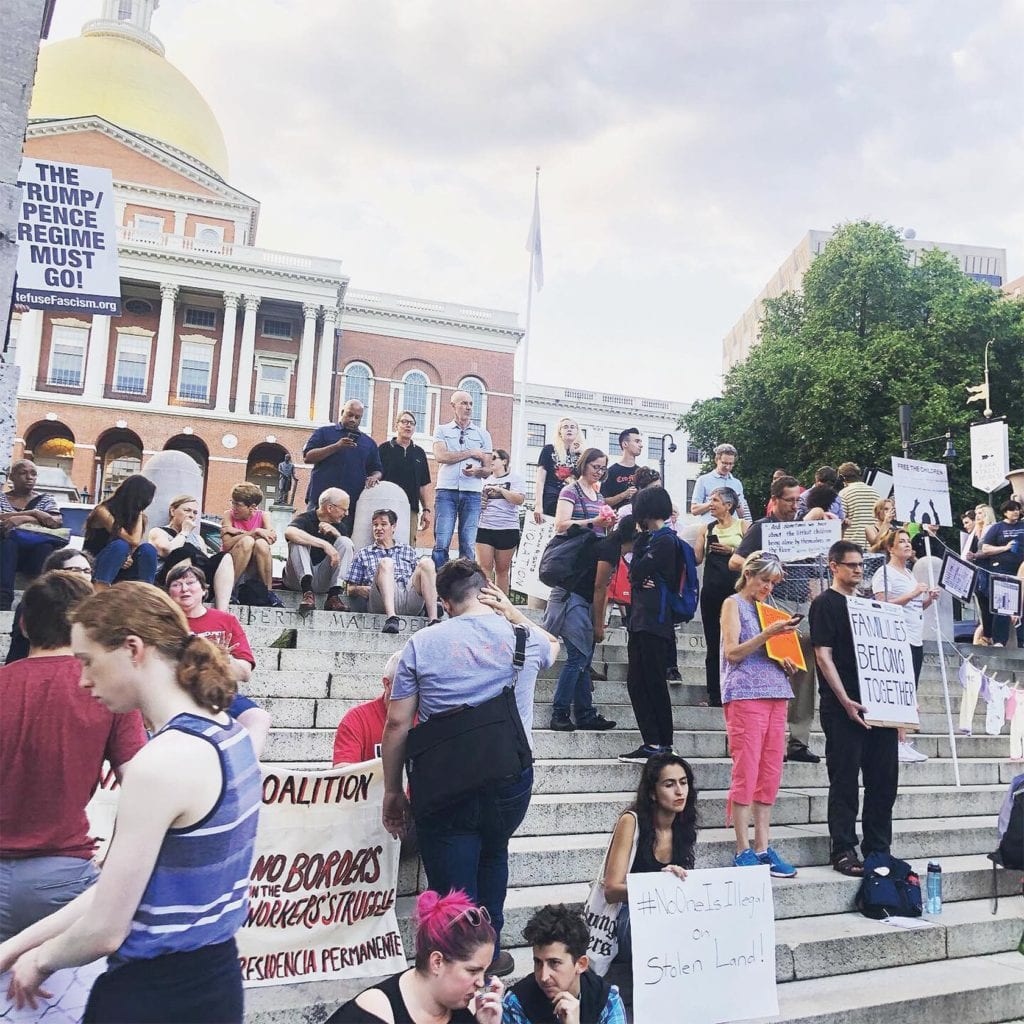Local solidarity with ICE detainees
Demonstrators decry conditions in camps

More than 1,000 people gathered last Friday evening in the Boston Common to stand in solidarity with migrants detained at the border and to demonstrate against the reported inhumane conditions in several Immigration and Customs Enforcement detention centers.
The event, organized by Lights for Liberty, was one of the 40 demonstrations held across the state and was fueled by recent news from the Trump administration that ICE raids over the weekend would target thousands of undocumented migrants in major cities for deportation and family separation.
Several speakers highlighted that the fear instilled by ICE’s policies throughout the country drove them to organize in the communities to protect immigrants. Joel Rivera, from the Massachusetts Immigrant and Refugee Advocacy Coalition, explained how people can work to make local communities safer for those who might be undocumented immigrants.
“What can we do about deportations here? What can we do about family separation here? Well I have one thing for you: It’s called the Safe Communities Act,” Rivera said, referring to the bill before the Massachusetts legislature this session.
“The Safe Communities Act is meant to limit the local police from cooperating with ICE. So, if the federal government wants to detain and deport our immigrant families, they can do that, but that’s not on our taxpayer dollars,” he explained.
Leah Bloom, an organizer of the event, outlined the goal of the Lights for Liberty initiative in an interview with the Banner.
“I think the main takeaway that there is something that we can do. It’s not enough to sit on your laptop and yell into Facebook. It’s not enough to come out here and chant,” she said. “We have to learn how we can actually fight in the legislature to change policy.”
Bloom also echoed Rivera’s remarks about the ability Boston’s residents have to make immigrants in our own communities safer from immigration enforcement officials.
“I think often people think in Massachusetts, this is not an issue that affects us. That’s not the case,” she said. “The Greater Boston area has a huge immigrant population and we have people who are living in fear, who are terrified that at any moment they could be deported or separated from their families.”
Speakers from the Boston Teachers Union spoke out against the hostile environment that current laws and policies create for undocumented students.
“We know that without a welcoming school environment, students do not learn as well. We know that when students are struggling to process traumatic events at the same time as they are working to learn in school, they are not fully accessing their education,” one teacher explained.
Rebecca Mulligan, a 10th-grade English teacher and member of the BTU organizing committee that works to help immigrant youth, explained the work she does to serve these students.
“A major part of our work is creating change in our schools from the ground up, to build our schools into fully welcoming spaces for undocumented students and their families, spaces where their futures are taken into consideration,” she said.
“As an English teacher of immigrant youth,” she continued, “I take a sharp focus on the fact that immigrants have a constitutional right to an equal education. They have a right to an education whether they have legal documentation or not.”
As the sun set, the crowd stood out in front of the Massachusetts Statehouse for a candlelight vigil to remember those who died in detention. Demonstrators chanted, “Close the camps!” — referring to the ICE facilities at the Mexico border where many have reported conditions so poor that young children died while in detention.
While some have said that the concentration camp analogy is an exaggeration and belies the suffering of those in the Holocaust, Bloom justified the perspective held by many of the rally-goers.
“As a Jew, I do think that what we are seeing are concentration camps,” she said. “They are not death camps, but they are, by definition, concentration camps where we are concentrating vulnerable people and stripping them of their rights and freedom.”
She added, “When we’re debating whether or not to call these concentration camps, we have missed the point.”






